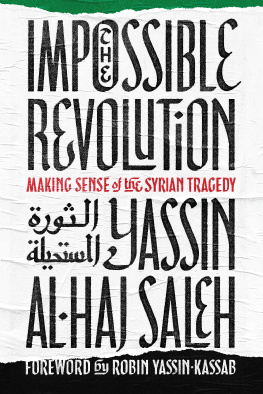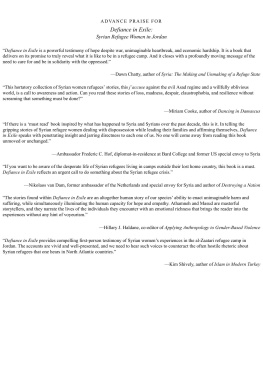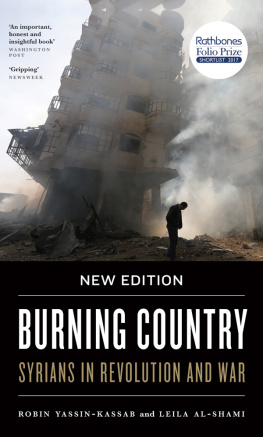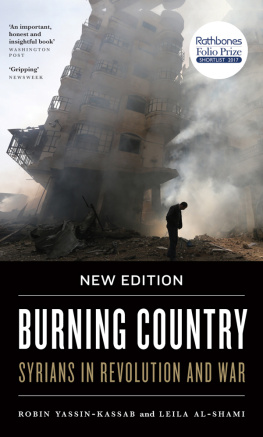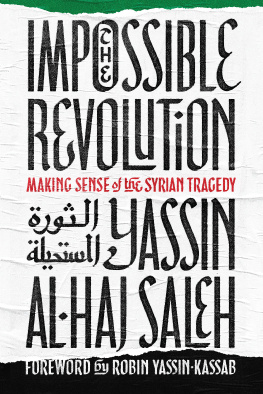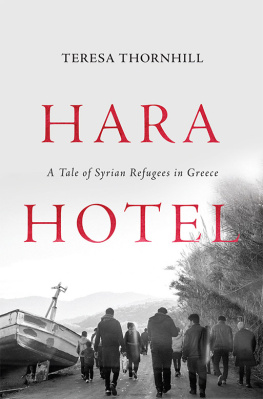al-Haj Saleh - Impossible Revolution
Here you can read online al-Haj Saleh - Impossible Revolution full text of the book (entire story) in english for free. Download pdf and epub, get meaning, cover and reviews about this ebook. City: Syria, year: 2017, publisher: Haymarket Books, genre: Politics. Description of the work, (preface) as well as reviews are available. Best literature library LitArk.com created for fans of good reading and offers a wide selection of genres:
Romance novel
Science fiction
Adventure
Detective
Science
History
Home and family
Prose
Art
Politics
Computer
Non-fiction
Religion
Business
Children
Humor
Choose a favorite category and find really read worthwhile books. Enjoy immersion in the world of imagination, feel the emotions of the characters or learn something new for yourself, make an fascinating discovery.
- Book:Impossible Revolution
- Author:
- Publisher:Haymarket Books
- Genre:
- Year:2017
- City:Syria
- Rating:4 / 5
- Favourites:Add to favourites
- Your mark:
- 80
- 1
- 2
- 3
- 4
- 5
Impossible Revolution: summary, description and annotation
We offer to read an annotation, description, summary or preface (depends on what the author of the book "Impossible Revolution" wrote himself). If you haven't found the necessary information about the book — write in the comments, we will try to find it.
Impossible Revolution — read online for free the complete book (whole text) full work
Below is the text of the book, divided by pages. System saving the place of the last page read, allows you to conveniently read the book "Impossible Revolution" online for free, without having to search again every time where you left off. Put a bookmark, and you can go to the page where you finished reading at any time.
Font size:
Interval:
Bookmark:
The
Impossible Revolution
Making Sense of the Syrian Tragedy
Yassin al-Haj Saleh
Foreword by Robin Yassin-Kassab

Haymarket Books
Chicago, Illinois
INTRODUCTION
The chapters of this book were written over the course of about four years in four cities: Damascus, Douma, Raqqa, and Istanbul. Except for Damascus, where I had lived in hiding for two years following the start of the Syrian revolution, only one chapter was written in each city. I have been living in Istanbul for more than two years now, but I prefer not use the term exile to describe my life in Turkey, since the word has elitist connotations in Syria and conjures up images of certain intellectuals or politicians living in Europe. It also does not seem an appropriate term for other reasons: not only am I just one individual among many in a continuing exodus involving more than 4 million Syrians (even according to the questionable statistics of international bodies), but I live here while the whereabouts of my wife, Samira al-Khalil, remain unknown. She was abducted by a local Salafist organization in Douma near Damascus in December 2013, along with three of our friends, Razan Zaitouneh, Wael Hamada, and Nazem Hamadi. In addition, my brother Firas was abducted by Daesh (ISIS, or so-called Islamic State) in July 2013 and remains missing, as do other friends and acquaintances: Ismail al-Hamidh, Paolo DallOglio, Ibrahim al-Ghazi, Abdullah al-Khalil, and Mohammad Nour Matar. These circumstances are not something from which one can be exiled; rather, they remain very present and personal.
I am also not an exiled person because throughout the past six years, and up until the moment of writing, Syrians, including myself, have not been allowed a single day of reprieve. Not one day has passed without Syrians being killed by airstrikes or under torture. We are not distant from these events, and we have not had time to catch our breath and look around, to check on ourselves and on our neighbours, to think about where we are and ponder the path that has taken us to where we are today; most important, we have not been able to mourn and bid farewell to our loved ones who have crossed over to the other side, and to re-examine our new condition and start wrestling with it.
The following introductory pages address my personal journey between Damascus and Istanbul over the course of fifty-six months, in order to clarify the circumstances in which the books ten chapters were written and to make a connection between personal and public experiences. One striking thing about the Syrian tragedy is that it has ruthlessly obliterated the space between what is personal or private, and what is public. Almost every Syrian individual has become a public person, and the public sphere contains endless tales, different and similar, narrated by numerous people who have had first-hand exposure to the ordealpeople whose voices have long been silenced. Today, and since the beginning of the revolution, possession of discourse has been an essential aspect of Syrians attempts to own politics in their country, and to own the country itself.
This book was written by someone involved in the conflict, though I have tried to provide enough general information to benefit an impartial, open-minded reader.
***
I moved to Damascus in late 2000, so had been living there for a little over ten years at the time the Syrian revolution broke out in March 2011. Before that, I was in Aleppo, labouring to finish my higher education after a seventeen-year hiatus, sixteen years of which I spent in prison for belonging to a communist party that opposed the Hafez al-Assad regime. After moving to Damascus, I dedicated myself to writing and translation. This was just after Bashar, Hafezs son, became president and sole possessor of Syria by means of hereditary succession. My move to Damascus put me in a good position to observe the development of conditions in Syria during the years of Assad Jr.s rule, both before the revolution and for two and a half years after it broke out. Throughout that time, Samira, herself a former political detainee who spent the years 19871991 in prison, was my perfect support and ideal partner, both in our private life and in our public cause, and even in my writing. She read what I wrote, sometimes before publication and sometimes after, and found it not too bad. Her enthusiasm for many of my articles is what marks them warmly in my memory. Our relationship began in September of 2000, and in two years we were married.
On the night of 30 March 2011, I gathered a few of my books and belongings and left the house to live in seclusion for an indefinite period of time. Back then I was not wanted by authorities. I wished to live in hiding so that I could freely say and write what I wanted. Bashar al-Assad had just finished his first speech after the revolution erupted in mid-March, and an Arab satellite channel asked me to comment on it. When I did, I found myself beating around the bush. At that moment, I decided to live in hiding.
My name was known but not famous, and hardly anyone would have recognized my face. Samira was not known in the public sphere. The task I set for myself was to try to explain what was going on in the country as clearly as possible, without self-censorship.
During the first four months, my new residence was not in a house, though it was located in a good spot in the centre of the city. Samira was able to come by every now and then, but couldnt stay with me. Each time, she had to engage in complex manoeuvres so as to leave no trace that might lead to my hideout.
At that time, I wrote a weekly column for Al-Hayat newspaper, and also gave interviews and wrote for other publications from time to time. I averaged two articles a week. The selection of ten articles for this book was taken from nearly 380 published articles and interviews, written between the eruption of the Syrian revolution in March 2011 and November 2015, 235 of which were written before I left the country in October 2013. With so much material to consider, the resulting selection could only be somewhat arbitrary, sacrificing a lot of what might have provided a more detailed testimony about Syria and the revolution, and about me personally.
The first essay that appears here, Revolution of the Common People, was published in June 2011, about three months after the revolution began. As the reader may notice, the article is dominated by a sense of confidence and hope. It tries to demonstrate the democratic, liberatory nature of the intifada, or the uprising, as I used to refer to it at that time. The article highlights the revolutions creation of new identities, for many people as well as for many big cities and towns that were resurfacing from under the Assadist eclipse, which had obscured the majority of Syrians. I also discuss two social components of the revolution: a traditional component that is close to conservatism and comes out of impoverished towns and neighbourhoods; and a modern component comprising the educated middle class. These two components are united by the centrality of work in their social, political, and moral perspectives. The Syrian revolution is one of a working society, of people who make a living from their work as opposed to those who live on the profits of their position or power-associated privilege. The essay also objects to the exclusion of Islamists from the conceptualization of a new, democratic Syria, since not once have Islamists been excluded in Syria (or its neighbouring countries) without the exclusion of all independent opposition currents as well: leftist, secular, and liberal ones; exclusions that left the country (and the Arab region) a political wasteland. While it is true that including Islamists in a pluralistic political system is not an easy task, the alternative has been tried-and-tested, and is unsatisfactory.
Font size:
Interval:
Bookmark:
Similar books «Impossible Revolution»
Look at similar books to Impossible Revolution. We have selected literature similar in name and meaning in the hope of providing readers with more options to find new, interesting, not yet read works.
Discussion, reviews of the book Impossible Revolution and just readers' own opinions. Leave your comments, write what you think about the work, its meaning or the main characters. Specify what exactly you liked and what you didn't like, and why you think so.

